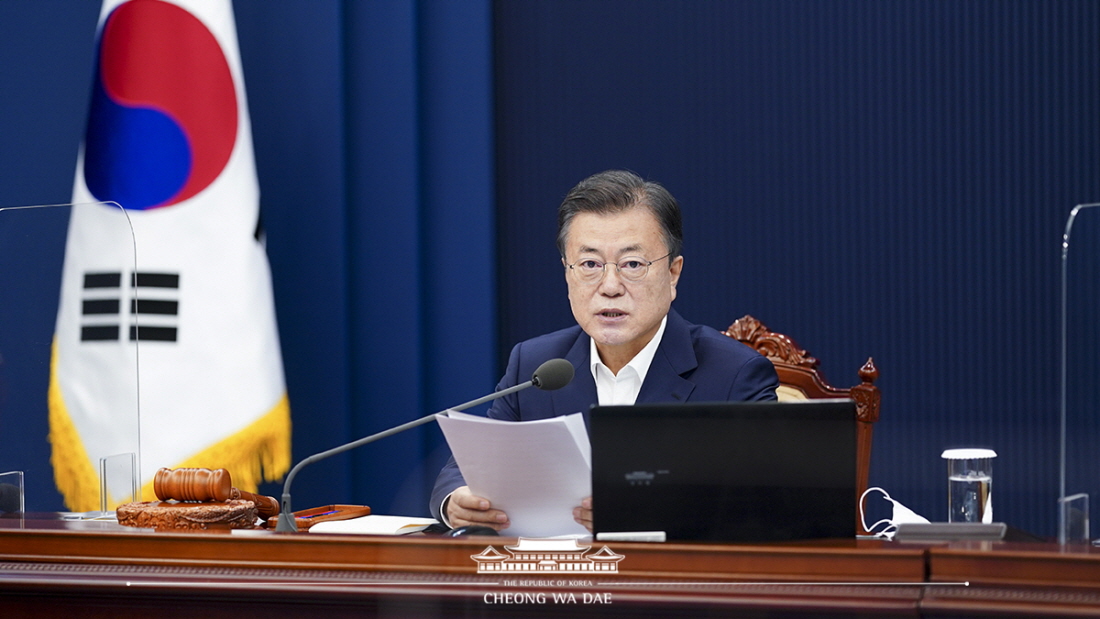이 웹사이트는 제19대 대통령 임기 종료에 따라 대통령기록관이 「대통령기록물 관리에 관한 법률」에 의해 이관받아 서비스하는 대통령기록물입니다. 자료의 열람만 가능하며 수정 · 추가 · 삭제는 불가능합니다.
다만, 「개인정보보호법」에 의하여 개인의 정보를 보호받기 원하시는 분은 관련 내용(요청자, 요청내용, 연락처, 글위치)을 대통령 웹기록물 담당자(044-211-2253)에게 요청해 주시면 신속히 검토하여 조치해 드리겠습니다. 감사합니다.
SPEECHES & REMARKS
BRIEFINGS

Let me begin the 18th Cabinet Meeting.
The advance GDP estimate for the first quarter released today by the Bank of Korea shows that our economy in the first three months of this year has already surpassed its pre-COVID-19 state. This quarterly growth rate beats the expectations of international organizations and markets; our economy has recovered to its pre-crisis level a quarter faster than originally expected. This recovery is the fastest among key OECD members. It is indisputable proof of our economy’s astounding resilience. Now the Korean economy can be said to have emerged from the long, dark tunnel of COVID-19 and been put back on a normal growth trajectory. Our economy has clearly indicated that it is even stronger when facing a crisis.
Korea has become one of the world’s ten largest economies in terms of GDP during the COVID-19-induced global economic crisis. We have emerged as a world pacesetter that spearheads rapid economic recovery. Our economy has fared well and grown even stronger because all the economic stakeholders – households, businesses and the Government – have united as one and assumed their respective roles to overcome the economic crisis. As a matter of fact, it has been confirmed that exports, investments, private sector consumption and fiscal spending have all registered positive growth, contributing to the first quarter’s expansion. I extend my deepest respect and gratitude to the people and all the economic stakeholders for pulling together while enduring hardships.
What is more promising is the fact that the economic recovery in the second quarter appears to be stronger than that of the first, continuing the upward trend. Exports in April have increased more than 40 percent compared to the same month last year, and consumer spending is also regaining vitality as evidenced by a significant rise in credit card sales. If this trend holds, a swift and strong recovery is forecast. It may even be enough for this year’s growth rate to exceed the mid- to upper-three-percent range.
In addition to the economic recovery’s quantitative performance, remarkable achievements in our transformation into a pacesetting economy are enabling the Korean economy to leap forward qualitatively. The transition to a digital, low-carbon economy is gaining speed, and the spread of the second venture boom along with the growth of such new industries as biohealth, system semiconductors and eco-friendly cars is sufficient to show our economy’s dynamism and future competitiveness. While making all-out efforts to accelerate the economic rebound, the Government will further spur the grand transformation into a pacesetting economy.
Although I have emphasized this many times, it’s important to keep in mind that we cannot achieve a full economic recovery and take-off without inclusiveness. We may feel a warm breeze in our economy, yet there are still many struggling amid the crisis. Though gradually improving, employment conditions will require more time to reach pre-COVID-19 levels. In particular, the gaps and inequalities widened by the pandemic are national tasks that must be handled by concentrating our abilities on them. The Government will have to do its utmost to reduce COVID-19-induced inequality through an inclusive recovery and resurgence.
It has been three years since South and North Korean leaders announced the Panmunjom Declaration for Peace, Prosperity and Unification of the Korean Peninsula in front of 80 million Koreans. Although the scenes at the foot bridge are still vivid, it is very unfortunate that there has been a protracted impasse in dialogue between North Korea and the United States since their summit in Hanoi collapsed.
The Panmunjom Declaration is a milestone for peace that no one can undermine. In no way can the progress toward peace as laid out in the Panmunjom Declaration be reversed. Advancing the outcome of the Panmunjom Declaration faces many difficulties due to external conditions and realistic limitations. However, the situation on the Korean Peninsula is being managed in a more stable manner than ever before without military conflict, despite large and small unfavorable factors for inter-Korean relations. Peace continues even amid strained conditions.
However, the present peace is an incomplete one. On the foundation of the Panmunjom Declaration, we have to move toward irreversible and permanent peace. The moment to end long deliberations and resume dialogue is approaching. It is time to prepare to restart the clock of peace based on the lessons learned while enduring pain.
I hope that the summit between the Republic of Korea and the United States scheduled for late May will serve as an opportunity to further solidify the ROK-U.S. alliance and, at the same time, to closely coordinate policy toward North Korea and set the direction for progress. Our Government will explore ways to advance the peace process on the Korean Peninsula by building upon solid cooperation with the Biden Administration. My hope is that a breakthrough can be made to restore dialogue and cooperation between the two Koreas and between the United States and North Korea.



